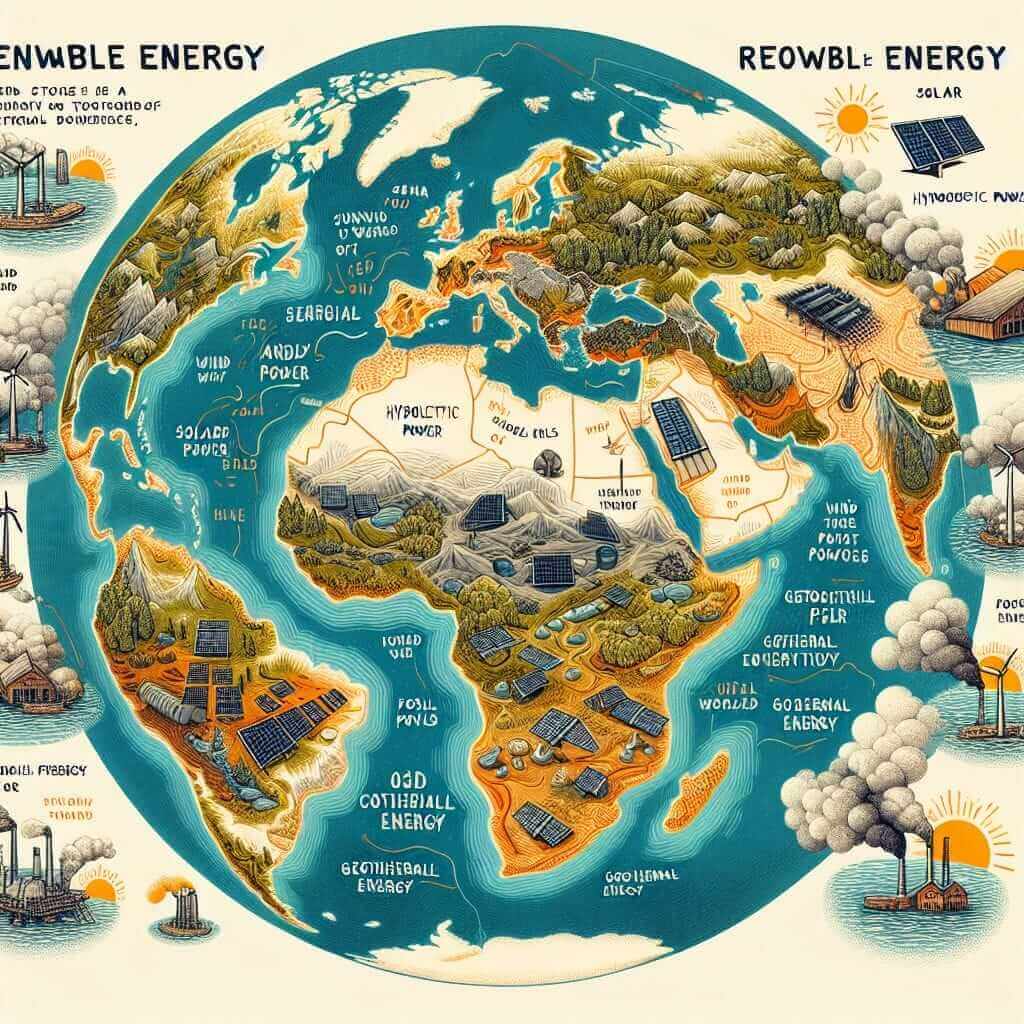The IELTS Reading section is designed to evaluate a wide range of reading skills, including the ability to read for gist, read for main ideas, read for detail, understand inferences and implied meaning, recognize a writer’s opinions, attitudes, and purpose, and follow the development of an argument. With the increasing focus on global issues, topics related to renewable energy and its impact on geopolitics frequently appear in reading passages.
Renewable energy’s influence on global politics has become more pronounced due to the growing urgency to address climate change, the demand for sustainable resources, and the reduction of geopolitical power dynamics centered around fossil fuels. This article will serve as a practice reading passage for those preparing for the IELTS exam, closely mirroring the format and complexity of questions you might encounter.
Practice Reading Passage
Renewable Energy and Global Geopolitics
As nations worldwide increasingly adopt renewable energy technologies to combat climate change and secure sustainable sources of energy, the traditional dynamics of global geopolitics are undergoing significant transformation. The reliance on fossil fuels has long dictated the political and economic relationships between energy-producing and energy-consuming countries. However, the shift towards renewables is gradually reshaping these relationships, introducing new players and altering the balance of power.
Renewable energy sources like solar, wind, hydro, and geothermal are distributed more evenly across the globe compared to fossil fuels. This geographical diffusion is reducing the dependency on energy-rich regions and is enabling countries to achieve greater energy independence. For instance, regions in Sub-Saharan Africa are harnessing their abundant solar and wind resources, transforming their energy sectors and reducing their reliance on imported energy.

One of the most notable impacts of the renewable energy transition is on the oil and gas-exporting nations, particularly those in the Middle East. These countries have historically been pivotal players in global geopolitics due to their vast fossil fuel reserves. The decline in global demand for oil and gas, driven by the rise of renewables, is compelling these nations to diversify their economies and invest in renewable energy projects themselves.
Additionally, the shift to renewable energy is fostering new alliances and partnerships. Countries rich in rare earth minerals, essential for manufacturing renewable energy technologies and batteries, are gaining strategic importance. For example, China, which controls a significant portion of the world’s rare earth supply, is solidifying its geopolitical influence by dominating the renewable energy market and the supply chain for critical materials.
The renewable energy transition also has significant implications for international trade and economic policies. Nations that excel in renewable energy technology innovation and production are positioning themselves as global leaders in the new energy paradigm. This technological edge is translating into economic advantages and influencing trade balances.
Questions
Multiple Choice
-
The main reason for the reduction in dependence on energy-rich regions is:
A. The unequal distribution of renewable energy resources.
B. The even geographical distribution of renewable energy resources.
C. The increasing global demand for oil and gas.
D. The political instability in energy-rich regions. -
What impact has the rise of renewables had on oil and gas-exporting nations?
A. Increased reliance on fossil fuels.
B. Pressure to reduce fossil fuel reserves.
C. The necessity to diversify their economies.
D. Greater control over the renewable energy market.
True/False/Not Given
- The shift towards renewable energy has no significant impact on global geopolitics.
- Sub-Saharan Africa’s energy sector is increasingly independent due to its renewable resources.
- The renewable energy transition is strengthening international reliance on fossil fuels.
Matching Information
Match the information to its corresponding paragraph:
A. Impact on oil and gas-exporting nations
B. Geographical distribution of renewables
C. Formation of new international alliances
D. Implications for international trade
Short-answer Questions
- Which country controls a significant portion of the world’s rare earth supply?
- What are the renewable energy sources mentioned in the passage?
Answer Keys
Multiple Choice
- B. The even geographical distribution of renewable energy resources.
- C. The necessity to diversify their economies.
True/False/Not Given
- False – The passage discusses significant impacts on global geopolitics.
- True – Sub-Saharan Africa is reducing reliance on imported energy by utilizing its renewable resources.
- False – The transition reduces reliance on fossil fuels.
Matching Information
- A – Paragraph 2
- B – Paragraph 1
- C – Paragraph 3
- D – Paragraph 4
Short-answer Questions
- China
- Solar, wind, hydro, geothermal
Common Pitfalls
When answering questions like the ones provided, students often:
- Skim too quickly and miss vital details
- Misinterpret True/False/Not Given questions by inferring information not mentioned
- Struggle with identifying the main idea in complex paragraphs
Vocabulary
- Geopolitics (n) /ˌdʒiː.oʊˈpɒl.ɪ.tɪks/: the study of the effects of geography on international politics and relations.
- Renewable (adj) /rɪˈnjuː.ə.bəl/: capable of being replaced naturally.
- Diversify (v) /daɪˈvɜː.sɪ.faɪ/: to increase the variety of products or services produced.
- Dependency (n) /dɪˈpen.dən.si/: reliance on something or someone.
- Innovation (n) /ˌɪn.əˈveɪ.ʃən/: a new method, idea, or product.
Grammar Focus
Relative Clauses
- Relative clauses are used to give additional information about a noun without starting a new sentence. This can often be seen in academic writing to add complexity and detail.
- Example: “Renewable energy sources, which are distributed more evenly across the globe, are reducing dependency on energy-rich regions.”
Tips for High IELTS Reading Scores
- Practice skimming and scanning techniques to quickly locate information.
- Familiarize yourself with different question types to understand what is required.
- Enhance your vocabulary to quickly understand and decipher academic texts.
- Take regular timed practice tests to improve your reading speed and comprehension under exam conditions.
With these strategies, you’ll be well-prepared to tackle the reading section of the IELTS exam confidently. Good luck!